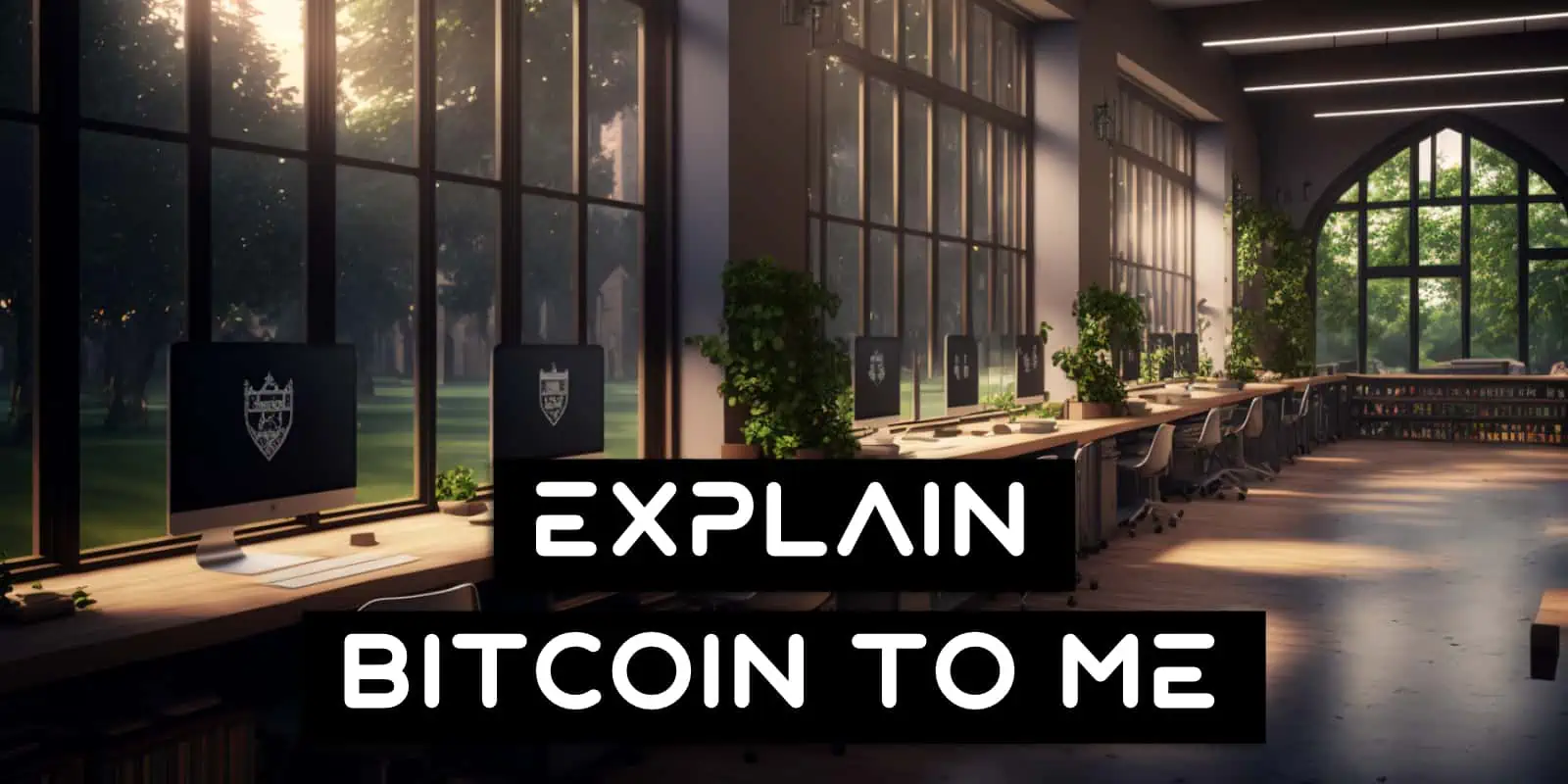Welcome frens! Bitcoin’s a truly amazing new technology that can be a bit intimidating to get your head around. Maybe all your friends have been talking about and using it but you’re not really sure what the whole “Bitcoin thing” is or why it’s so special.
That’s OK.
We’re the experts and even we remember a time when we heard about it in the news and had no idea what they were going on about. No one likes to be “behind” but don’t worry, we’re going to explain Bitcoin in a way that’s quick, easy, accurate and above all, gives you an amazing start. We’ve designed our material to help you rocket ahead of 99.9% of everyone else out there so let’s get started!
Contents
Explain Bitcoin To Me Like I’m 5
What is Bitcoin? Bitcoin is the first and most globally recognized cryptocurrency. That means it’s a currency backed by math and cryptography, rather than by a single country or government.
It’s free for anyone in the entire world to own and you can use it by sending or receiving it to other people just like any other money. Unlike fiat money, it cannot be stopped or censored and its rules cannot be changed, no matter how rich or powerful a country or person is.
>> Deeper Dive: 4 Breakthrough Characteristics Of Bitcoin (And Why It Has Value)
Just like you need an email client to send and receive emails, you also need a special program called a “wallet” to send and receive bitcoins. There are many different Bitcoin Wallet programs (just like there are many different email programs) and they’re free for anyone to use on desktops, laptops, phones or tablets.
People use Bitcoin to send and receive monetary value just like they would with other currencies because it has its own special properties and can do things those other currencies can’t. For example, Bitcoin can be sent to anyone, anywhere in the world within a few minutes even if they have no bank account or are using a different currency than you are.
Other people like it because it’s not controlled by any country or government. It’s also fully open source and free meaning no one can tell you what to do with it. Bitcoin is one of the hardest, most modern, unique and custom engineered monies in history. More special properties include:
- Limited Supply: There will only ever be 21 million bitcoins
- Distributed: All transactions are stored on tens of thousands of computers all across the world
- Always Open: Unlike legacy banks, you can buy, sell, send or receive it globally, 24/7/365
- Transparent: The Bitcoin Blockchain is public, immutable and viewable to anyone world wide
- Peer-To-Peer: No banks are involved, transactions go directly from one person to the other
- Permissionless: It can be used without having to ask anyone for permission
- Censorship Resistant: You’d have to stop the Internet to stop it
- Easily Divisible: 1 BTC can be divided into 100 million pieces called “Satoshi”
- Protected: The worlds biggest supercomputer made up of miners protect every Bitcoin
- Final Settlement: Bitcoin transactions, once confirmed in a block are irreversible
- Pseudo-Anonymous: There are no names or accounts. It should be noted that it’s still possible to link Bitcoin Addresses to real life names if care is not taken to protect your Bitcoin Privacy
What Problems Does Bitcoin Solve?
At its core, Bitcoin was created to be an online version of physical cash that removes the need for trusted third parties like banks. The original whitepaper is literally titled “Bitcoin: A Peer-to-Peer Electronic Cash System“. At a high level it solves a number of core problems we have with money today such as:
- It allows you to transact without having to trust banks or other companies
- It allows those without government ID to transact (many billions of people)
- It allows those who are censored (mostly women) to transact freely
- It allows those with unstable currencies to reliably save
- It allows anyone to opt out of fiat currencies which are regularly debased by governments
- It allows you to send or receive very small transactions (eg. $0.01 or even $0.0001)
- It allows for near free cross border payments that happen in minutes 24/7/365
- And more!
To find out more about the core problems it solves you can read our dedicated piece on Why Was Bitcoin Created? As a result of solving these problems there are many great use cases already for it. Some of the most common are:
- Store monetary value over time
- Store monetary value without anyone’s permission
- Store monetary value beyond the reach of a corrupt government
- Send money overseas instantly and cheaply
- Send free and instant Remittance
- Transact without being banned or censored
- Take wealth with you if fleeing a country
You can also spend your bitcoins at hundreds of thousands of stores, resorts, online websites and more. For a full list have a look at What Can You Do With Bitcoin?
Bitcoin’s Blockchain Technology
Just like any type of money, Bitcoin needs a way of keeping track of who owns what bitcoins. This is referred to as a ledger and is essentially just a big database / file that is constantly updated to show who owns what. For example it might say “Bill owns 1 bitcoin”.
When a transaction is broadcast and ownership of various bitcoins change hands, it’s bundled together into a “block”. This block is then added or “chained” onto all the existing ones. All these individual blocks, chained together, form the blockchain which is stored on all Bitcoin Full Nodes.
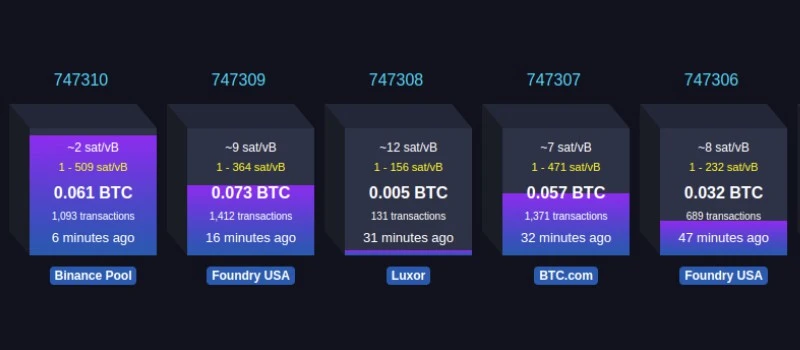
A great way to visualize the blockchain and this process is to look at mempool.space as shown above. You can see each block – live! – as transactions from all over the world are added to it and then sealed forever into the ever growing Bitcoin blockchain. The blockchain is Immutable – meaning it can never be altered – and transparent.
>> Read more: What’s The Difference Between Bitcoin And Blockchain?
How Does Bitcoin Mining Work?
The Bitcoin network has thousands of nodes in it. Each node is capable of mining and contains both the Mempool (shown below with green transactions) as well as a full copy of the Bitcoin blockchain (with the blue blocks).
The mempool is just all the most recent transactions that haven’t yet been confirmed into the blockchain. Mining takes those transactions in the mempool, bundles them together and confirms them into the blockchain.
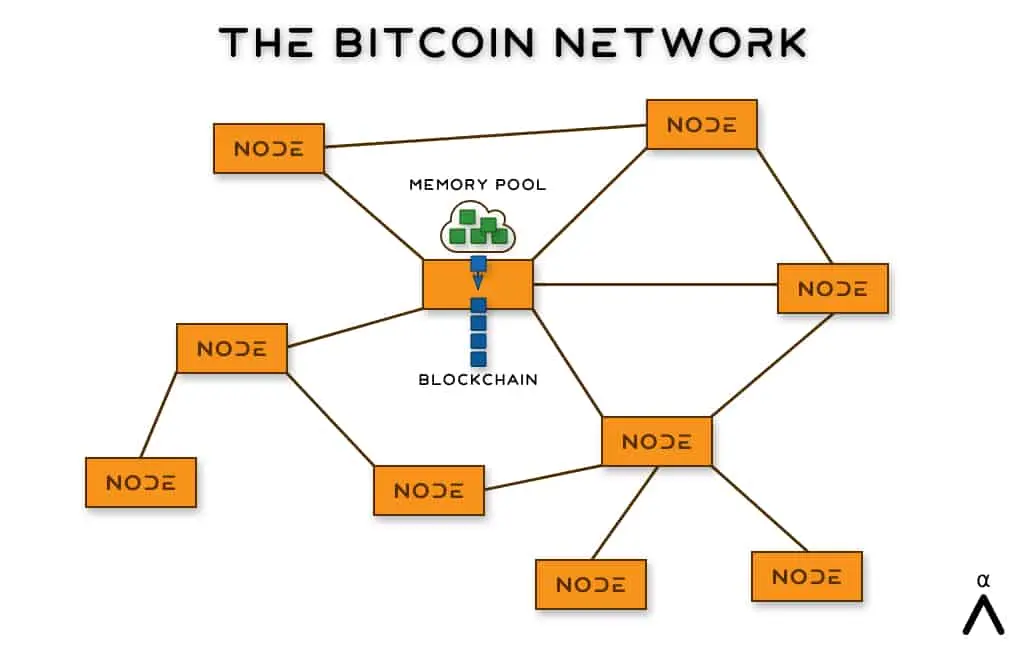
How mining works in detail is beyond the scope of this simple starters guide, but we have very deep and detailed pieces if you’re interested in it. We have an overview piece on What Is Bitcoin Mining? as well as a very special, in depth look at Proof of Work (PoW) that has been reviewed by Adam Back, the inventor of Proof of Work and cited author in the Bitcoin Whitepaper, for accuracy and correctness.
New to Athena Alpha? Start today!
How To Buy Bitcoin
Buying bitcoin is no different to trading other currencies such as the USD for EUR. You can buy a whole bitcoin (1 BTC) or fractions of a bitcoin (0.0005 BTC). Buying bitcoins can be done in many places and comes in two types:
- Non-KYC/AML Decentralized Exchanges (DEX)
- KYC/AML Centralized Exchanges (CEX)
KYC (Know Your Customer) or AML (Anti Money Laundering) rules require you to surrender all your personal information (name, address, DOB, drivers license, photo etc) to a private company for permanent record keeping and sharing with many third parties and governments before they allow you to transact. Some examples include Binance, Coinbase, eToro or PayPal.
To buy bitcoins through them you’ll need to create an account, give up all your private information and then fund that new account with fiat money like USD, EUR or other cryptocurrencies.
Keep in mind you’re sending funds to a completely independent company that isn’t regulated or backed by your government. There is no “Federal Guarantee” if the company goes bankrupt or simply steals your money and centralized exchanges going bankrupt is very, very common. We don’t recommend using them.
>> Learn More: Crypto Exchange Bankruptcies
If you buy through a CEX you also link your Bitcoin Addresses to your personal identity forever. This is extremely dangerous to you in multiple ways as covered in our piece on Bitcoin Privacy.
Non-KYC decentralized exchanges like Bisq completely side step all the issues Centralized Exchanges have. This is because you don’t have to reveal your real world identity to use them.
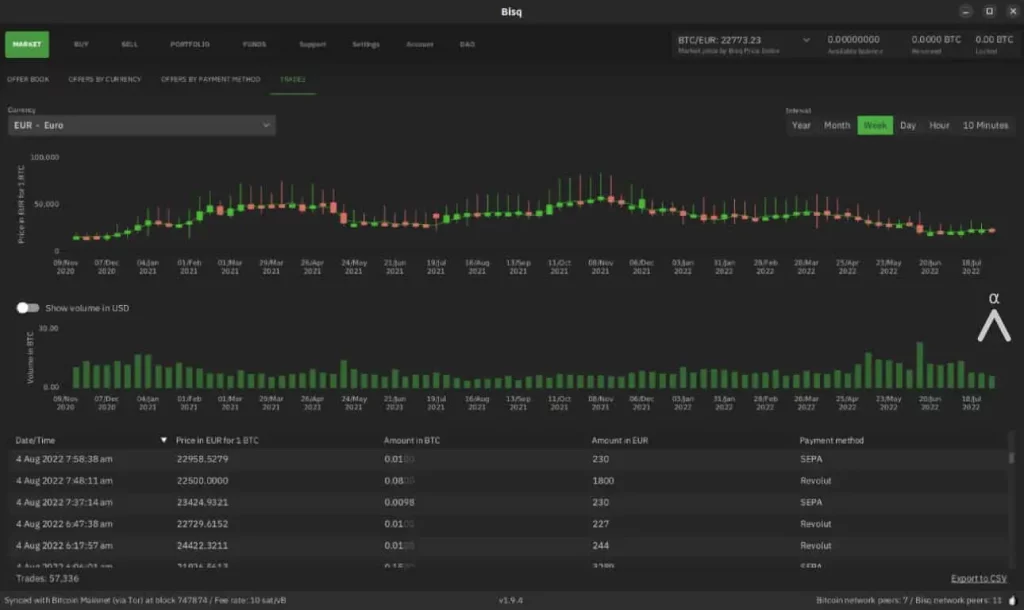
When you open a program like Bisq (or the new Bisq 2) for the first time, it creates a random profile that isn’t linked to your real name. When the trade occurs, it only goes from you to the receiver (or visa versa) and there are no other companies or entities involved.
After you’ve bought your first bitcoins you should transfer them to your own Bitcoin Wallet. A Bitcoin wallet is simply software that:
- Manages your private keys which gives you access to spend your bitcoins
- Generates new Bitcoin Addresses so you can receive bitcoins
- Creates and broadcasts transactions to the network so you can spend your bitcoins
They come in many shapes and sizes such as this software wallet called Sparrow Wallet.
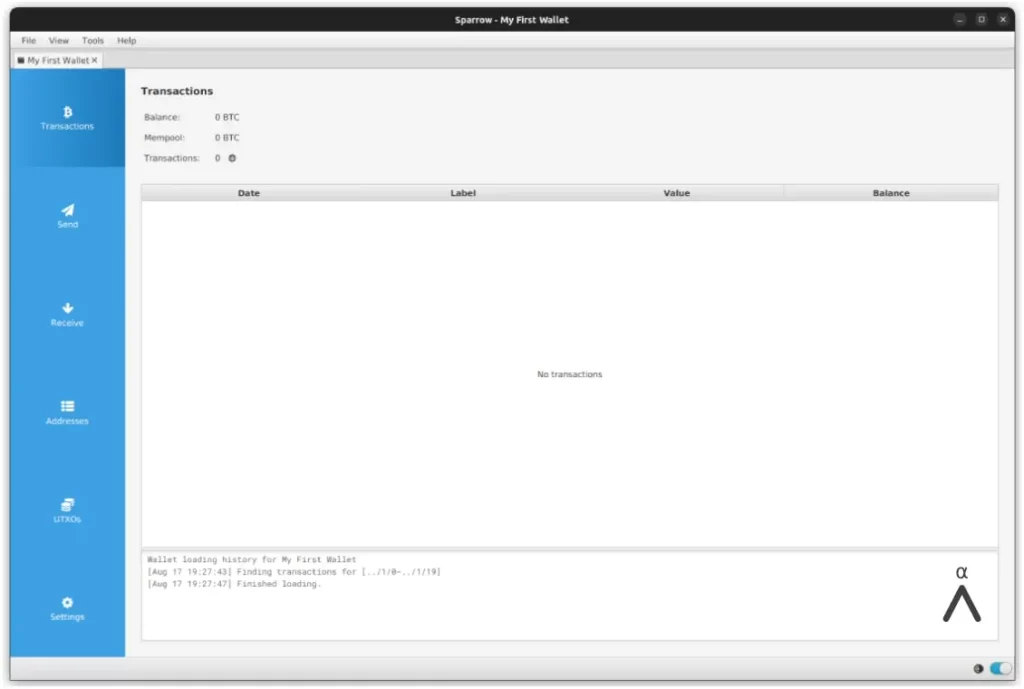
We have a whole in depth guide on wallets here: What Is A Bitcoin Wallet? This explains the difference between custodial and self-custodial, private and public keys as well as the many different types of software and hardware wallets.
Finally you should learn how to properly value your new asset as we describe in What Is A Bitcoin Worth? This will give you a bit more history and context as to why Bitcoin is such an amazing new invention akin to electricity and the Internet itself. It also covers what determines the value of a bitcoin, the units, its price history and how Bitcoin compares to other types of money such as Gold or the USD.
FAQ
How Do I Explain Bitcoin To My Mother?
1. Humans use money to exchange value for goods and services such as glass beads and lately, gold and fiat currencies
2. Bitcoin is a new money that no one controls (like gold) rather than being issued by a government
3. Bitcoin stores all transactions in a file called the Blockchain, which is public and shared between all the computers running the Bitcoin software
4. Bitcoin is secure because it uses cryptography to protect all the transactions on the Blockchain and has operated successfully since 2009
5. Just like any other currency, Bitcoin can be used to buy groceries, holidays, cars or even coffee. It’s also used to store wealth and preserve purchasing power like real estate or stocks
How Does Bitcoin Make You Money?
While many get interested in Bitcoin due to its signature “Number Go Up” (NGU) technology, Bitcoin is not actually designed to make money. It’s not an investment, it’s a type of savings that aims to preserve your purchasing power and be resistant to censorship. The best proven way is to buy and hold it for at least 4-5 years
Is Bitcoin Actual Money?
Yes. While anything can technically be used as money (eg. sea shells or glass beads), when assessing if something is a “good” money we usually grade it based on six key characteristics. When doing this, Bitcoin scores much higher than any other money we have including gold or the USD. Read more: What Is A Bitcoin Worth?
Who Created Bitcoin?
Satoshi Nakamoto released the famous Bitcoin Whitepaper in October of 2008. On the 3rd of January, 2009 the first Bitcoin block was mined, called the “genesis block” or Block 0. They continued working on the project with other developers until 2010 when they left the project. You can get more details about the creation of Bitcoin in our piece When Did Bitcoins Start?
Is Bitcoin Safe?
Just like with any other type of money, bitcoins are highly sort after and so there’s plenty of criminals, Bitcoin Scams and other things to watch out for. While Bitcoin itself is quite safe and has been a reliable store of value over the past 10+ years, there are a number of risks that you should be aware of when using it that we cover in Is Bitcoin Real? And Is It Safe?
How Much Is The Minimum Amount To Invest In Bitcoin?
All throughout the long History Of Investing it has been heavily restricted to those that are rich and powerful. Now with Bitcoin, the playing field has been leveled and anyone, anywhere can participate. There are no minimum amounts when buying Bitcoin, however due to mining and trading fees you’ll likely want to buy at least $50-$100 or more to make it worth your while.

